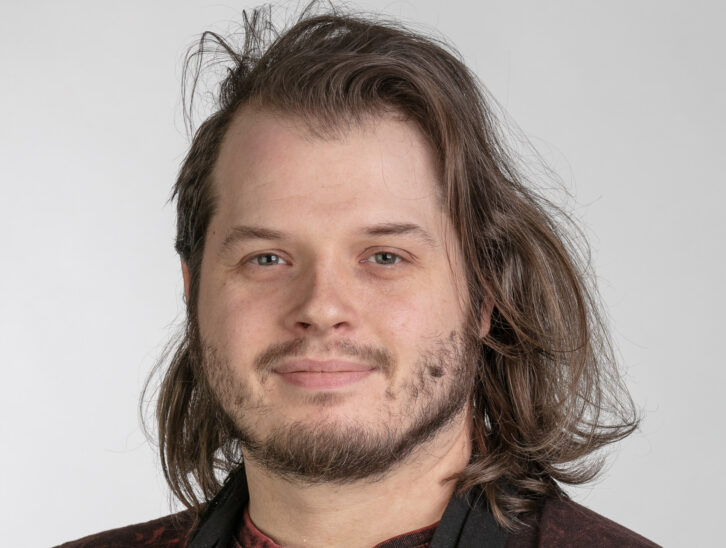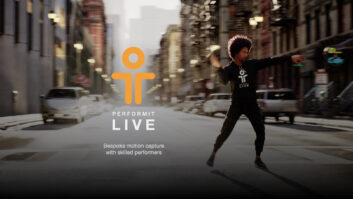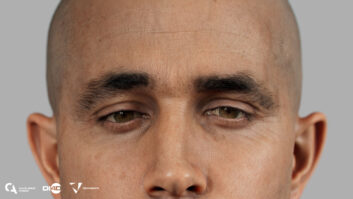Talk us through an average day in your role
My role at the University of Salford is quite dynamic, which is something I truly enjoy. I am currently part of a two-person team that manages the Motion Capture space within the School of Arts, Media, and Creative Technology. This space is used by students across various disciplines – performance, animation, dance, and games design. Ranging from undergraduate to postgraduate levels, including MA, MSc, and PhD students.

Our day-to-day work revolves around responding to the evolving needs of our students. We guide them through the intricacies of motion capture, helping them not only understand the technology but also apply it in ways that enhance their creative projects. Whether it’s through capturing movement for animation or performance-based projects, we ensure they gain practical experience and leave with a deep understanding of how to leverage this technology.
When we’re not directly supporting students, we focus on innovating and improving the ways our motion capture space can serve them better. We actively gather feedback and use it to develop new techniques and applications for the technology. Recently, we’ve collaborated with other university colleagues on a project that integrates motion capture with medical simulation. We ran a pilot project for a virtual patient system, where a simulated patient is controlled in real-time via motion capture and an iPhone for face tracking which allowed medical students to interact with the virtual patient, diagnosing ailments as part of their practical training.
How did you get started in the media industry?
My journey into the media industry began during my time at university. I attended a masterclass led by the head of an independent film company, and I seized the opportunity to reach out afterward, which led to me working on their projects. The company specialised in low-budget horror feature films and heavy metal music videos, an ideal fit for me at the time!
Armed with nothing more than a basic SLR camera, some builders’ lights, and a whole lot of enthusiasm, we set out to create. It was a small, tight-knit team, so I had the chance to explore various aspects of production, from cinematography to visual effects. One memorable experience was playing a creature in one of our films, spending a sweltering summer night running around in a heavy overcoat and rebreather as a demonic miner.
Although the days were long and the pay was minimal, the experience of working in eerie, unusual locations with total creative freedom was priceless. It was a fast-paced, high-energy environment where we could experiment and push boundaries, and I loved every moment of it!
What training did you have before entering the industry?
Before pursuing my degree, I worked in IT as a technician from the age of 18. I had always loved film and visual effects, but I tried to take a more pragmatic approach to my career by focusing on technology, a field where I excelled. While I enjoyed the technical aspects of IT, I quickly found it lacked the creativity I craved, and I began feeling unfulfilled.
Seeking another path, I initially enrolled in a course to teach English to speakers of other languages, alongside learning Japanese. My thought process was that having a second language would open up opportunities for travel, and teaching would allow me to work anywhere in the world. I thoroughly enjoyed learning Japanese, and teaching became a passion of mine. Watching students come to life when they grasped new concepts was incredibly rewarding, and I found great satisfaction in helping others learn. However, during this period, I experienced a personal loss, the death of a close friend, which led me to take time to reflect deeply on my life and career. I realised that while I had enjoyed certain aspects of my previous paths, I had never truly taken the leap to pursue my passion: film.
That moment of reflection was a turning point. I decided to take a gamble and enrolled in a degree in film production and media technology, chasing what I truly loved. My time at university gave me two invaluable things. First, it gave me the time and space to practice, research, and immerse myself in the skills I was developing. Second, it introduced me to a network of peers, people I could collaborate with, who helped me develop my ideas and challenged my ways of working, just as I did for them. This collaborative environment was essential for my growth, and I continue to value the power of teamwork and shared creativity.
Why do you enjoy working in the industry?
Creativity, first and foremost. Even though my work involves technology, every interaction with students and academic staff is a creative process. We take the time to understand their goals and aspirations within the motion capture space, and from there, we develop engaging learning materials. Our process involves bringing students into a Game Engine in real-time so that they can move around as their characters and on a weekly basis, we get to design and build interactive learning materials for our students.
This blend of creativity and technical skill allows us to not only train the next generation of users in this technology but also deepen our own expertise along the way. Equally rewarding is the opportunity to work with the minds of tomorrow. Watching students develop their confidence as creatives and storytellers is an experience that never loses its magic. Knowing that I’ve played a small role in their journey and helped make a positive difference in their lives is genuinely fulfilling.
What piece of advice would you offer someone looking to explore a role similar to yours?
For me, it all comes down to passion. Passion opens doors, it shows others that you’re eager to learn, that you care deeply about your craft, and that you find joy in what you create. It’s a driving force that can be refined and focused, and without it, everything becomes so much harder.
My advice to anyone looking to develop a skill set is to find a way to connect what you’re learning to an outcome that you’re truly passionate about. When I first started exploring programs like After Effects as a teenager, I found the tutorials overwhelming. There was so much to learn, and I lacked the patience to start with the basics like menus and workspaces. I’m someone who learns through play, and I wanted to dive in immediately and start creating. At the time, I was obsessed with Star Wars and desperately wanted to be a Jedi. So, I searched for tutorials on how to create lightsabers. Despite not understanding much of the technicalities at the time, I was so determined to see myself wielding a lightsaber that I stuck with it. That passion drove me to push through the learning curve, and eventually, I mastered After Effects, something I still use professionally today.
Even now, when learning new technology like the Unreal Engine for Motion Capture, one of the first things I did was give myself a lightsaber! If you can link your learning process to something you love, there’s nothing you can’t achieve.






